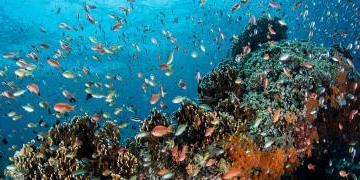SCELG leads £20 million programme aimed at tackling threats to the world’s oceans
22 January 2019: The Strathclyde Centre for Environmental Law and Governance (SCELG) is to lead an ambitious £20-million, 5-year programme – the UKRI GCRF One Ocean Hub – aimed at transforming the global response to cumulative, urgent threats to the ocean. The Hub builds on the research findings of the BENELEX and MARINE BENEFITS projects, as well as insights from SCELG consultancies with UN partners under the thematic theme on oceans. The Hub was developed during a workshop organized by SCELG during its second Festival of Environmental Law and Governance in Glasgow in 2018. The Hub further builds on SCELG's cooperation with the Institute of Uncanny Justice, SCELG's "Island Explorers" Programme and collaboration with Glasgow School of Art on island studies (EILEAN).
Prof Morgera and Dr Diz will serve as Directors of the Hub, which involve more than 50 partners in Africa, South Pacific and the Caribbean, including world-leading research centres, governmental, non-governmental and community organizations, as well as multiple UN agencies.
Press Release UK Government (22 January 2019):
UK experts to work with global partners to tackle global grand challenges. [...] The projects include: The One Ocean Hub, led by the University of Strathclyde, which will bring researchers and local communities together to keep oceans sustainable and cut pollution."
Cooperation to realise an integrated and sustainable vision
The Hub will bring together the competing interests and agendas of the individuals, groups and organisations that rely on our oceans to realise a vision of an integrated and sustainable approach to conservation and sustainable use.
A key priority will be to ensure the knowledge, experiences and rights of those most-reliant upon the oceans, and disproportionately affected by our failure to protect them, are recognised. The team will set out to uncover the less tangible values of the ocean, and the hidden ‘trade-offs’ in ocean decision-making. The goal is to ensure decision-making at multiple levels (local to international) is based on evidence of risks and opportunities among competing ocean uses.





